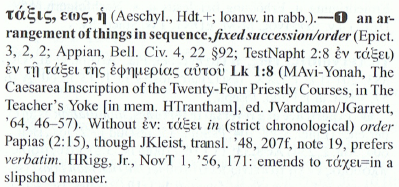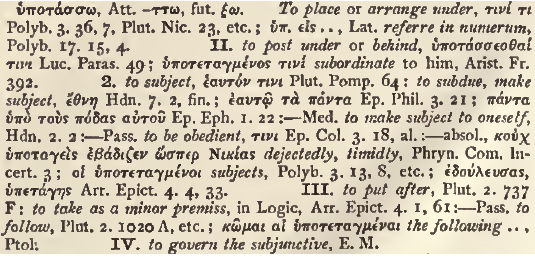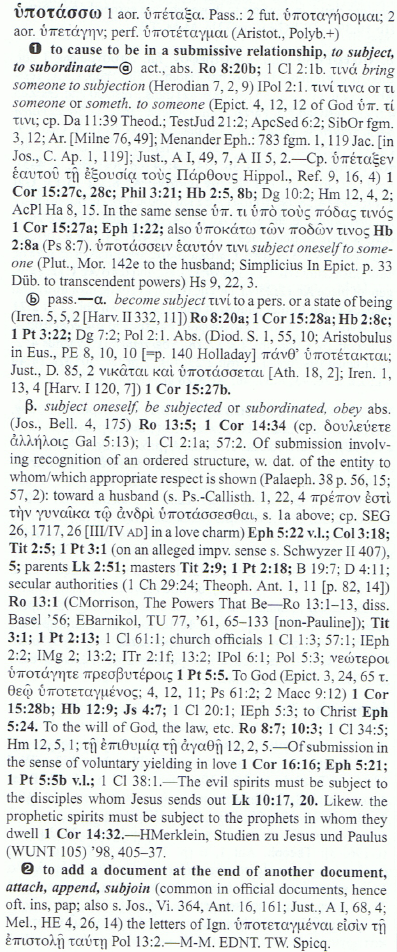πάντα δὲ εὐσχημόνως καὶ κατὰ τάξιν γινέσθω. (Nestle Aland 28)
Let all things be done decently and in order. (1 Corinthians 14.40)
Order is important in the church. Without order there can be chaos and confusion. Most particularly is this the case with the exercise of spiritual gifts, which is the occasion for Paul’s appeal for order at the conclusion of 1 Corinthians 14. Two meanings are possible for the Greek phrase, κατὰ τάξιν (kata taxin), corresponding to two related meanings of τάξις, one more general and one more specific. To start with the specific, the first definition given in the Bauer-Danker lexicon (BDAG), τάξις can mean ‘an arrangement of things in sequence’:
For example, in Luke 1.8:
Now it happened that while he was performing his priestly service before God in the appointed order (τάξει) of his division, (NASB)
the idea is of one priestly division succeeding another in their service.
But, following BDAG, τάξις can mean more generally ‘a state of good order’:
For example, in Colossians 2.5,
For though I am absent in the flesh, yet am I with you in the spirit, joying and beholding your order (τάξιν), and the stedfastness of your faith in Christ. (ASV)
there is no idea of succession, but simply of good order.
BDAG lists the occurrence of τάξις in 1 Corinthians 14.40 under this second meaning of ‘a state of good order’, but then suggests that κατὰ τάξιν ‘probably’ means ‘one after the other’ here, with the idea of succession. As an instance of the use of the phrase in this sense, BDAG cites Lucian’s account of the false prophet Alexander the Paphlagonian, who lived in the second century AD. Men queued up, as it were, to receive an oracle from the diviner, and these were granted, according to Lucian, in the order (κατὰ τάξιν) that the applications had been made:
This example demonstrates that the phrase κατὰ τάξιν is capable of conveying the idea of succession, but of course does not prove that it does so here. In The Persian Wars (Book 8.86), Herodotus uses κατὰ τάξιν (translated ‘in array’) along with σὺν κόσμῳ (with order, translated ‘orderly’) to convey the orderly arrangement of the Greek forces in comparison to their enemies:
 The idea here is not specifically of succession, but of more general orderliness. τάξις is derived from the verb τάσσω, which means, according to BDAG, ‘to bring about an order of things by arranging’. A perfect participle, τεταγμένων, of τάσσω, is used in this quotation from Herodotus, in conjunction with the negative conjunction ὄυτε (‘neither’), to describe the ‘disordered’ state of the forces of the foreigners.
The idea here is not specifically of succession, but of more general orderliness. τάξις is derived from the verb τάσσω, which means, according to BDAG, ‘to bring about an order of things by arranging’. A perfect participle, τεταγμένων, of τάσσω, is used in this quotation from Herodotus, in conjunction with the negative conjunction ὄυτε (‘neither’), to describe the ‘disordered’ state of the forces of the foreigners.
The point about the meaning of κατὰ τάξιν arises because of Paul’s instructions in verse 27 that those who speak in a tongue should do so ἀνα μέρος, ‘in turn’:
If anyone speaks in a tongue, let there be two or at the most three, each in turn, and let one interpret. (NKJV)
and in verses 30 and 31 that prophetic utterances should be given καθ’ ἕνα, ‘one by one’, rather than two or more speaking simultaneously:
29 Let two or three prophets speak, and let the others judge. 30 But if anything is revealed to another who sits by, let the first keep silent. 31 For you can all prophesy one by one, that all may learn and all may be encouraged. (NKJV)
Presumably, the thought in BDAG is that Paul is ‘probably’, with κατὰ τάξιν, referring back specifically to this matter of the orderly succession of prophetic utterances. I find this unconvincing. The phrase occurs immediately after the passage about the silence of women in the assembly. This is a matter of order, also, as I will attempt to show below. It seems far more likely that Paul had in mind both these aspects of the conduct of church meetings, and indeed also the need for messages in tongues to be interpreted, which he stresses in the earlier part of the chapter. I do not find any translators following BDAG’s suggestion and translating κατὰ τάξιν here as ‘in orderly succession’ or with other words to the same effect.
Two instances of the use of ὑποτάσσομαι, ‘to submit, be subject to’
I have pointed out that the word τάξις, ‘order’, derives from τάσσω, ᾽to arrange, put in place’. Another derivative of τάσσω, used frequently in the New Testament, is ὑποτάσσω, ᾽to subject, subordinate’. ὑπό with the accusative case means ‘under’, and as evidence that the meaning of ὑποτάσσω was still by New Testament times maintaining a firm connection with the meaning of its constituent parts, Liddell and Scott’s classical Greek lexicon gives its primary meaning as ‘to place under, arrange under’ with examples of usage from Polybius (264-146 BC) and Plutarch (45-127 AD):
In the New Testament, the word is used most often in the middle voice (‘subject oneself’) and passive voice (‘be subject, submissive, obedient’), as can be seen from the full entry in BDAG:
Young men are to be subject to the elders (1 Peter 5.5), bond-servants to their masters (Titus 2.9, 1 Peter 2.18), Christians to the secular authorities (Romans 13.1, Titus 3.1, 1 Peter 2.13), and wives to their husbands (Ephesians 5.22, Colossians 3.18, Titus 2.5, 1 Peter 3.1,5). We are to submit to God (James 4.7, Hebrews 12.9), and the church to Christ (Ephesians 5.24). The Lord Jesus was subject, when a child, to his parents, and when all things have been subjected to Him, He Himself will be subjected to the One who subjected all things to Him (1 Corinthians 15.28), so that God may be all in all. Hallelujah, praise His Name! What wonderful, wise and pleasing arrangements God has made for His redeemed and holy people in a fallen and broken world.
In 1 Corinthians 14, ὑποτάσσω occurs twice, once in connection with the orderly succession of prophetic messages, and once in connection with the proper conduct of women in the assembly. In both cases it is associated with the keeping of silence. First, as quoted above, Paul has instructed in verse 30 that if one prophet is speaking, and something is revealed to another, then the first speaker should be silent (σιγάτω). He explains in the next verse that this will allow all to prophesy in orderly succession (though not all in one meeting). Then in verse 32 he adds the further explanation:
καὶ πνεύματα προφητῶν προφήταις ὑποτάσσεται, (Nestle-Aland 28)
and the spirits of the prophets are subject to the prophets.
Paul is pointing out that the will of the Christian prophet is not taken over by the prophetic spirit, with the consequence that he is able to bring his message to a close if he is made aware of another prophet ready to speak. Elucidation as to the meaning of πνεύματα (‘spirits’) in verse 32 can be found in verse 12:
οὕτως καὶ ὑμεῖς, ἐπεὶ ζηλωταί ἐστε πνευμάτων, πρὸς τὴν οἰκοδομὴν τῆς ἐκκλησίας ζητεῖτε ἵνα περισσεύητε. (NA 28)
So also you, since you are zealous of spiritual gifts, seek to abound for the edification of the church. (NASB)
J N Darby may be alone in translating πνεύματα literally as ‘spirits’:
Thus ye also, since ye are desirous of spirits, seek that ye may abound for the edification of the assembly. (Darby Translation)
with even Young’s Literal Translation rendering πνεύματα as ‘spiritual gifts’:
so also ye, since ye are earnestly desirous of spiritual gifts, for the building up of the assembly seek that ye may abound; (YLT)
It is clear that these πνεύματα, whatever they are, are from God, since Paul encourages the Corinthians to abound in them. But in 1 Corinthians 12.4, Paul has explained that while there are many χαρίσματα, ‘gifts of grace, gifts’, there is only one πνεύμα, Spirit:
Διαιρέσεις δὲ χαρισμάτων εἰσίν, τὸ δὲ αὐτὸ πνεῦμα· (NA 28)
There are diversities of gifts, but the same Spirit. (NKJV)
Again, after listing nine spiritual gifts, including prophecy, Paul says that they are all worked by ‘one and the same Spirit’:
πάντα δὲ ταῦτα ἐνεργεῖ τὸ ἓν καὶ τὸ αὐτὸ πνεῦμα διαιροῦν ἰδίᾳ ἑκάστῳ καθὼς βούλεται. (NA 28)
But one and the same Spirit works all these things, distributing to each one individually as He wills. (NKJV)
So what are these ‘spirits’, in the plural, that the Corinthians are zealous for? Angels of God are described as ministering spirits λειτουγικὰ πνεύματα, but it would be somewhat surprising in the light of Colossians 2.18 if Paul were to approve of a zeal for angels! But could there exist divine spirits that participate in the exercise of the spiritual gifts described in 1 Corinthians 12?
Whatever the case, it is not the human spirit that is being referred to in verse 12, but something outside of the person, which the Corinthians are zealous for. This makes it less likely that it is the human spirit that is meant by πνεύμα in verse 32. Rather, it appears to be some kind of prophetic spirit (or spiritual gift or manifestation or working) that is subject to the prophets. The result is that the first prophet defers to the second prophet, allowing him to deliver his message. Thus, the result of the submission of the prophetic spirit to the prophet is the mutual submission of the prophets one to another, in accord with Paul’s exhortation to the saints in Ephesians 5.21:
Ὑποτασσόμενοι ἀλλήλοις ἐν φόβῳ Χριστοῦ (NA 28)
submitting to one another in the fear of God. (NKJV)
Then, as Paul moves in Ephesians 5 from the mutual submission of the brethren to the submission of a wife to her husband, so rather similarly in 1 Corinthians 14, he turns next to the submission of women in the assembly:
Ὡς ἐν πάσαις ταῖς ἐκκλησίαις τῶν ἁγίων (34) αἱ γυναῖκες ἐν ταῖς ἐκκλησίαις σιγάτωσαν· οὐ γὰρ ἐπιτρέπεται αὐταῖς λαλεῖν, ἀλλ’ ὑποτασσέσθωσαν, καθὼς καὶ ὁ νόμος λέγει. (NA 28)
As in all the churches of the saints, the women should keep silent in the churches. For they are not permitted to speak, but should be in submission, as the Law also says. (ESV)
As in 1 Corinthians 14.30 and 32 the fruit of the submission of the prophetic spirit to the prophet was silence, so also here. If a woman were to speak in the assembly, then she would be exercising authority in her speaking, and so would not be in submission. Paul teaches the same thing in 1 Timothy 2.11:
Γυνὴ ἐν ἡσυχίᾳ μανθανέτω ἐν πάσῃ ὑποταγῇ· (NA 28)
A woman should learn in quietness and full submission. (NIV)
Hallelujah, thank God for His wonderful and divine order in the church assembly and in the home. Let the men regain our ability to speak in the church service. Let the women be quiet and be ready to ask their menfolk to explain in the home what has been spoken in the congregation:
εἰ δέ τι μαθεῖν θέλουσιν, ἐν οἴκῳ τοὺς ἰδίους ἄνδρας ἐπερωτάτωσαν· αἰσχρὸν γάρ ἐστιν γυναικὶ λαλεῖν ἐν ἐκκλησίᾳ. (NA 28)
And if they want to learn something, let them ask their own husbands at home; for it is shameful for women to speak in church. (NKJV)
The adornment of a woman should be hidden in her heart, in the incorruptibility of a gentle and quiet spirit (1 Peter 3.4). The men also must be slow to speak and quick to listen (James 1.19). Let us not give the ‘sacrifice of fools’ in the house of God (Ecclesiastes 5.1), but enter with meekness and quietness of heart, ready to obey the promptings of the Holy Spirit to speak if we must.
Andrew







